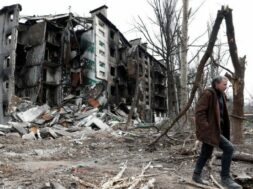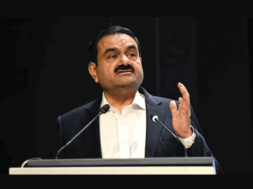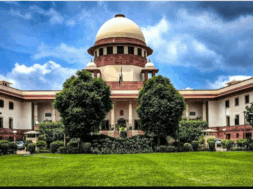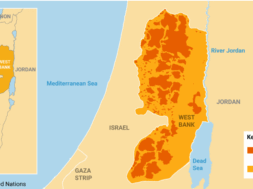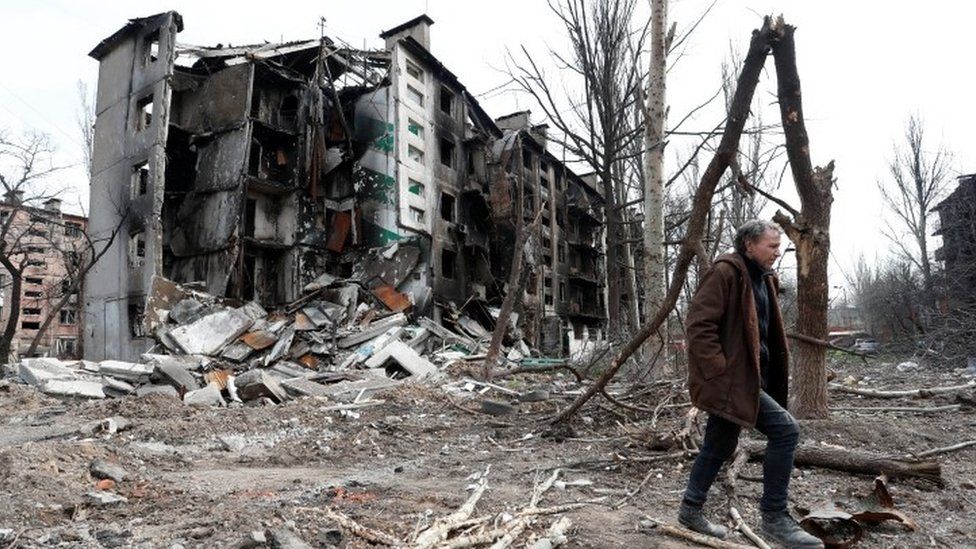
Ukraine War: Russia Claims “Complete Capture” of Mariupol
Manas Dasgupta
NEW DELHI, May 21: Nearly three months after the invasion of Ukraine, Russia on Saturday claimed the first major success having “completely captured” the strategic port city of Mariupol, its biggest victory over the small brother neighbour. The three-month siege of the port city in the current conflict is learnt to have already reduced much of Mariupol to smoking ruins with over 20,000 civilians in the city feared killed.
Russian Defence Minister Sergei Shoigu reported to President Vladimir Putin the “complete liberation” of the Azovstal steel plant in Mariupol — the last stronghold of Ukrainian resistance — and the city as a whole, spokesman Igor Konashenkov said. There was no immediate confirmation from Ukraine.
The war had its echo at the on-going Cannes Film Festival where a Ukrainian woman stripped off on the red carpet to reveal her body painted in the colours of the Ukrainian flag with the words “Stop Raping Us” in a solo protest. Wearing underpants stained red, the demonstrator shouted and posed for photographers before being led off by security guards. The demonstration apparently was to catch world’s attention towards the charges of invading Russian troops raping Ukrainian women whenever it ran over a human habitant in the war-torn country.
With all efforts to end the war seems failing, the Ukrainian president Volodymyr Zelensky amidst the deadlock in negotiations said on Saturday that the Ukraine war could be resolved only through “diplomacy.” “The end will be through diplomacy,” he told a Ukrainian television channel. The war “will be bloody, there will be fighting but will only definitively end through diplomacy”.
The Russian military said on Saturday it had destroyed a major consignment of Western arms in Ukraine’s Zhytomyr region, west of Kyiv, using sea-launched Kalibr cruise missiles. The defence ministry said in a statement the strike took out “a large batch of weapons and military equipment delivered from the USA and European countries” and intended for Ukrainian troops in the eastern Donbas region where the fighting is concentrated.
On the capture of Mariupol, Russia’s defence ministry said a total of 2,439 Ukrainian fighters who had been holed up at the steelworks had surrendered and had been taken prisoners. The defence of the steel mill had been led by Ukraine’s Azov Regiment, whose far-right origins have been seized on by the Kremlin as part of an effort to cast its invasion as a battle against Nazi influence in Ukraine. Russia said the Azov commander was taken away from the plant in an armoured vehicle.
Russian authorities have threatened to investigate some of the steel mill’s defenders for war crimes and put them on trial, branding them “Nazis” and criminals. That has stirred international fears about their fate. The steelworks, which sprawled across 11 square kilometres, had been the site of fierce fighting for weeks. The dwindling group of outgunned fighters had held out, drawing Russian airstrikes, artillery and tank fire, before their government ordered them to abandon the plant’s defence and save themselves.
The complete takeover of Mariupol gives Putin a badly needed victory in the war he began on February 24 — a conflict that was supposed to have been a lightning conquest for the Kremlin but instead has seen the failure to take the capital of Kyiv, a pullback of forces to refocus on eastern Ukraine, and the sinking of the flagship of Russia’s Black Sea fleet. Military analysts said Mariupol’s capture at this point is of mostly symbolic importance, since the city was already effectively under Moscow’s control and most of the Russian forces that were tied down by the fighting there had already left.
Russian forces shelled a vital highway and kept up attacks on a key city in the Luhansk region, hitting a school among other sites, Ukrainian authorities said. Luhansk is part of the Donbas. The Kremlin had sought control of Mariupol to complete a land corridor between Russia and the Crimean Peninsula, which it seized from Ukraine in 2014, and free up troops to join the larger battle for the Donbas. The city’s loss also deprives Ukraine of a vital seaport.
Mariupol endured some of the worst suffering of the war and became a worldwide symbol of defiance. An estimated 100,000 people remained out of a pre-war population of 450,000, many trapped without food, water, heat or electricity. Relentless bombardment left rows upon rows of shattered or hollowed-out buildings.
Meanwhile, the Group of Seven leading economies and global financial institutions are providing $19.8 billion in aid to bolster Ukraine’s public finances, Germany’s finance minister said. Poland and Portugal are trying to figure out ways of bringing Ukraine into the European Union even if some countries in the bloc balk at granting it speedy access. The U.S. is spanning a sea bridge over the Atlantic to support Ukraine with crucial equipment in its war against Russia, a senior official said, as a huge cargo ship at the Belgian port of Antwerp got ready to set sail for Germany.
President Joe Biden on Saturday signed legislation to support Ukraine with another $40 billion in U.S. assistance. The legislation, which was passed by Congress with bipartisan support, deepens the U.S. commitment to Ukraine at a time of uncertainty about the war’s future. Ukraine has successfully defended Kyiv, and Russia has refocused its offensive on the country’s east, but American officials warn of the potential for a prolonged conflict. The funding is intended to support Ukraine through September, and it dwarfs an earlier emergency measure that provided $13.6 billion.
The new legislation will provide $20 billion in military assistance, ensuring a steady stream of advanced weapons that have been used to blunt Russia’s advances. There’s also $8 billion in general economic support, $5 billion to address global food shortages that could result from the collapse of Ukrainian agriculture and more than $1 billion to help refugees.
Meanwhile, Representatives of the United States and several other nations walked out of an Asia-Pacific trade ministers meeting in Bangkok on Saturday to protest Russia’s invasion of Ukraine, officials said. Representatives from Canada, New Zealand, Japan and Australia joined the Americans in walking out of the Asia-Pacific Economic Cooperation (APEC) meeting. The walkout took place while the Russian representative was delivering remarks at the opening of the two-day meeting of the group of 21 economies.
